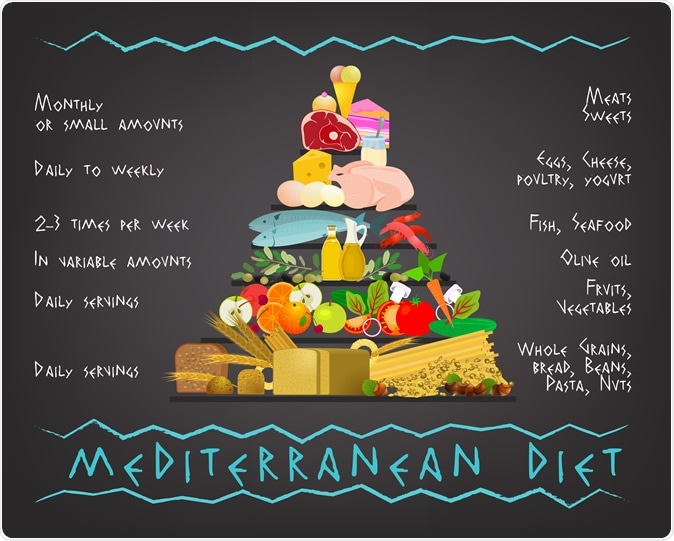The health benefits of the Mediterreanean diet were outlined in a landmark study titled, “Primary Prevention of Cardiovascular Disease with a Mediterranean Diet,” published in the prestigious journal New England Journal of Medicine in 2013.
The study found that people who followed the diet had a 28 percent lower risk of having a heart attack, stroke or die from any disease of the cardiovascular system, compared to those on a low fat diet. The study was widely accepted and began being prescribed by health care providers, and followed by thousands of health conscious individuals.
However, the journal retracted the paper (13th of June 2018) citing problems with the study design or the methods by which the study was carried out. This came after anaesthesiologist John Carlisle analysed the paper, and found that the participants had not been randomised correctly. Thus, the results of the study could not be directly attributed to the diet itself.
 Components of the Mediterranean Diet. Image Credit: Double Brain / Shutterstock
Components of the Mediterranean Diet. Image Credit: Double Brain / Shutterstock
The paper is now being revised by the researchers who conducted it to reduce the high and definitive claims that were made by the study. The new version will state that people following the Mediterranean diet were less likely to experience a stroke or heart attack, but that the diet was not the definitive reason for the health benefits.
Experts say this does not discredit Mediterranean diet in any way, nor does it suggest that the diet is unhealthy. This retraction mainly stops the researchers from making false but definitive claims about the benefits of this diet.
The trial came under scrutiny when anesthesiologist John Carlisle of Torbay Hospital in Torquay, U.K. wrote an article in the journal Anesthesia, looking at 5087 randomized, controlled trials.
Randomization is the gold standard for comparative trials when each person gets randomly assigned to a group. Carlisle was looking at design flaws of these trials using a computer program that checked for randomization problems.
For example, if a younger population was put on the mediterranean diet and an elderly population on the other, the former is bound to show a lower risk of heart disease or strokes. This skews the results, said Carlisle.
Carlisle was looking to see if there had been a uniform distribution of gender, age group, and ethnicity etc. in the trial. In total, he looked at studies from eight prestigious journals, including NEJM.
I calculated the probability that random allocation would generate a distribution of the baseline characteristic as extreme or more extreme than that reported in the trial. I then combined these probabilities for all baseline variables, generating a probability for each trial."
John Carlisle
He found that around 2 percent of the trials did not meet the randomization guidelines and thus their results were faulty. As a result of that study, 11 of NEJM’s papers were implicated. The journal editors looked into the matter and found that six of the papers contained mistakes.
One of these six was the 2013 trial on Mediterranean diet. NEJM Editor-in-Chief Jeffrey Drazen in Waltham, Massachusetts said that when they contacted the researchers of the study, they noted that the team had already begun working on correcting the errors as they had been made aware of the problems in the study design.
Following my analyses, the NJEM decided to investigate 11/934 trials that had the least likely distributions of these baseline variables, six of which required correction.
Five could be corrected easily, but another, about diet, had more complex problems and needed about nine months’ work by the authors before it could be replaced by a corrected version.
John Carlisle
A detailed audit of the study in question was conducted by lead author Dr. Miguel Ángel Martínez González from the University of Navarra Medical School. This revealed several problems in the study.
There were 7447 participants (aged 55 to 80) in the study from 11 study sites to be randomly assigned either Mediterranean diet or low-fat diet. It turned out that 1588 people of the total number of participants were not randomly assigned the diets.
Couples, for example, were assigned the same diet. In one of the sites, the lead investigator did not randomize at all and prescribed the same Mediterranean diet to the whole study population there and did not inform this to the investigators.
According to González the study was reanalyzed after removing these non-randomized individuals from the participant list. The results remained similar, he assured.
A reanalysis was conducted over a year with the help of Dr. Miguel Hernan of the Harvard T.H. Chan School of Public Health after removing the non-randomized participants from the whole population.
However, because the design of the study was flawed, the findings were no longer robust and the researchers to “tone down the results” and conclusions “just a little bit”.
It is difficult to answer hypothetical questions… We believe the evidence [in favor of the diet] is still strong, but not as strong as a randomized study in which the randomization was executed flawlessly.”
Jennifer Zeis, NEJM spokesperson
Zeis said that this was a problem but there was “no fraud” and that the records would be corrected.